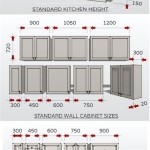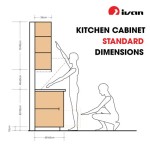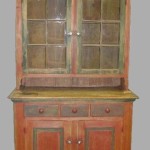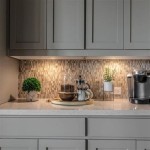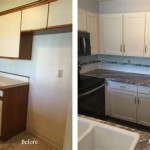Transforming Your Kitchen Cabinets into a Functional Desk Workspace
In the realm of contemporary living, maximizing space and functionality are paramount. For those seeking to elevate their workspace without sacrificing valuable square footage, converting kitchen cabinets into a desk workspace offers a compelling solution. This ingenious approach leverages existing storage solutions, fostering a harmonious blend of practicality and style within the heart of the home.
1. Choosing the Right Cabinet: Evaluating Space and Functionality
The initial step involves selecting a suitable cabinet for transformation. This decision hinges on factors such as available space, accessibility, and intended use. A base cabinet near a window or with ample counter space can provide a natural flow of light and a comfortable work surface. Consider the depth of the chosen cabinet, as shallower cabinets might necessitate a different approach to maximize workspace.
For instance, a shallow cabinet could be converted into a laptop stand with a pull-out shelf for keyboard and mouse while incorporating a vertical organizer for supplies. Deeper cabinets, on the other hand, can accommodate a desktop computer, offering more expansive desk space with ample drawer storage for files and office essentials.
2. Installing a Suitable Work Surface: From Butcher Block to Custom Countertop
Once the cabinet is identified, the next step involves selecting a work surface that complements the existing kitchen aesthetic. This could range from a simple butcher block counter to a customized countertop material of choice. Butcher block offers a natural and durable option with a warm appeal, while laminate countertops provide a budget-friendly and versatile solution. Should an existing countertop already exist, it can be leveraged as a work surface, leaving the cabinet’s storage space for organization.
Depending on the size and configuration of the cabinet, incorporating a pull-out shelf or a hinged door that doubles as a work surface can further enhance workspace functionality. For instance, a cabinet with a single door could have the door hinged to create a fold-down work surface when in use, seamlessly folding back into the cabinet when not in use.
3. Adding Comfort and Customization: Lighting, Storage, and Ergonomic Considerations
The final stage involves enhancing the workstation with personalized touches that enhance comfort and productivity. Adequate lighting is essential for minimizing eye strain and optimizing focus. A combination of overhead lighting and task lighting positioned directly over the work surface ensures proper illumination. Consider incorporating a desk lamp with a flexible arm for directional light and adjustable brightness levels.
Ergonomic considerations are equally vital for long-term comfort and productivity. Invest in a comfortable chair with adjustable height and back support, allowing for proper posture and reducing strain on the spine. A footrest can further enhance comfort and promote circulation. Depending on the configuration, a keyboard tray or mouse pad might be necessary to optimize hand and wrist positioning.
To further enhance the workspace, incorporate storage solutions tailored to specific needs. Drawer organizers and vertical file holders maximize efficiency within the cabinet, while wall-mounted shelves or a small bookshelf can accommodate additional books or supplies. A mounted corkboard or whiteboard offers a convenient space for notes and inspiration.

8 Kitchen Desk And Nook Designs To Keep Your Family Organized

How To Create A Diy Office Desk With Kitchen Cabinets

50 Home Office Designs With Kitchen Cabinets And Shelves Modern Storage Ideas Design Decor
:strip_icc()/101796026-907a57b0b7954f06beaf718003e5afab.jpg?strip=all)
Workspaces And Desks For Kitchens That Add Function Design

How To Create A Diy Office Desk With Kitchen Cabinets

20 Clever Ideas To Design A Functional Office In Your Kitchen

How To Create A Diy Office Desk With Kitchen Cabinets

Unique Home Architecture Built In Desk Office Design
:strip_icc()/101991607-5954ab026b754ce99936c2f8aea0a311.jpg?strip=all)
Workspaces And Desks For Kitchens That Add Function Design

Built In Kitchen Desk Design Ideas
Related Posts


